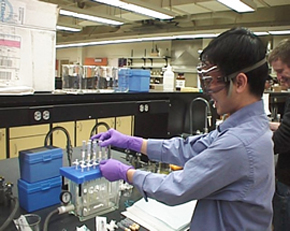Environmental Chemistry Degree
Environmental chemists examine how chemicals and the environment change after they interact with each other. Environmental chemists concern themselves with the household chemicals we pour down our drains after mopping the floor, the black smoke that billows from the tops of the chimneys at an industrial complex, and the toxic waste that gets buried in a remote landfill. Students who want to obtain an environmental chemistry degree desire to make a difference in the world by trying to better understand how the chemicals we discharge into our air, our water, and under our land affects our environment. Environmental chemists strive to understand the impact of pollutants, how to reduce contamination and what is the best way to manage the environment. Environmental chemistry is an arduous line of work that requires intense training in analytical, physical, organic and inorganic chemistry and a good sense of how these different disciplines relate to complicated environmental systems.
What Kind of Course Curriculum Does an Environmental Chemistry Degree Require?
Because of the interdisciplinary nature of environmental chemistry, students must work on their communication skills so they can efficiently express ideas to a nonscientific audience. Students enrolled in an environmental chemistry degree program should consider taking writing courses, communication classes, and possibly a few business relations courses so they can better communicate with coworkers and business executives with whom they will interact. Students enrolled in an environmental chemistry degree program will also take such course as:
- Nuclear and radiochemistry
- Environmental biogeochemistry
- Petroleum and organic geochemistry
- Organic chemistry
- Analytical chemistry
- Environmental science
- Inorganic chemistry
- Spectroscopy
- Atmospheric chemistry
What Job Opportunities Await Graduates with an Environmental Chemistry Degree?
An environmental chemist can perform multiple functions in the job market, and has a wide variety of field in which to work. Graduate can find work analyzing samples to determine in any contaminants are present to help to regulate and change industrial practices. Possible careers include:
- Toxicology consultant
- Ecotoxicologist
- Biogeochemist of Organic Contaminants
- Analytical chemist
- Environmental chemist
- Research and development chemist
- Safety specialist
Salary Expectations for Graduates with an Environmental Chemistry Degree
The median annual wagse for chemists in 2008 were $66,230 a year according to the numbers compiled by the Untied States Bureau of Labor Statistics. The middle 50 percent received a yearly salary in the range of $48,000 and $89,000, while the top 10 percent received a yearly salary in excess of $113,000. The first year’s salaries for individuals with chemistry degrees averaged $37,000 a year in 2009, according to the National Association of Colleges and Employers. The highest salaries were in careers dealing with research and development. The bureau estimates an expected three percent employment growth for chemists in the job market between 2008 and 2018. Graduates who possess an advanced degree, especially those with PhDs, are expected to enjoy better job prospects working in research labs for larger pharmaceutical and biotechnology firms. Chemists held an estimated 84,000 jobs in the U.S. in 2008.

